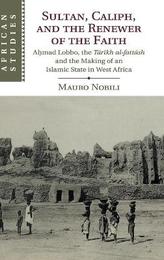
|
Sultan, Caliph, and the Renewer of the Faith: Ahmad Lobbo, the Tarikh al-fattash and the Making of an Islamic State in West Afri
Hardback
Main Details
| Title |
Sultan, Caliph, and the Renewer of the Faith: Ahmad Lobbo, the Tarikh al-fattash and the Making of an Islamic State in West Afri
|
| Authors and Contributors |
By (author) Mauro Nobili
|
| Series | African Studies |
|---|
| Physical Properties |
| Format:Hardback | | Pages:288 | | Dimensions(mm): Height 235,Width 157 |
|
| Category/Genre | African history |
|---|
| ISBN/Barcode |
9781108479509
|
| Classifications | Dewey:966.201 |
|---|
| Audience | |
|---|
| Illustrations |
Worked examples or Exercises; 2 Tables, black and white; 2 Maps; 10 Halftones, black and white
|
|
Publishing Details |
| Publisher |
Cambridge University Press
|
| Imprint |
Cambridge University Press
|
| Publication Date |
19 March 2020 |
| Publication Country |
United Kingdom
|
Description
The Tarikh al-fattash is one of the most important and celebrated sources for the history of pre-colonial West Africa, yet it has confounded scholars for decades with its inconsistences and questions surrounding its authorship. In this study, Mauro Nobili examines and challenges existing theories on the chronicle, arguing that much of what we have presumed about the work is deeply flawed. Making extensive use of previously unpublished Arabic sources, Nobili demonstrates that the Tarikh al-fattash was in fact written in the nineteenth century by a Fulani scholar, Nuh b. al-Tahir, who modified pre-existing historiographical material as a political project in legitimation of the West African Islamic state known as the Caliphate of Hamdallahi and its founding leader Ahmad Lobbo. Contextualizing its production within the broader development of the religious and political landscape of West Africa, this study represents a significant moment in the study of West African history and of the evolution of Arabic historical literature in Timbuktu and its surrounding regions.
Author Biography
Mauro Nobili is Assistant Professor at the Department of History and the Center for African Studies at the University of Illinois. A historian of pre-colonial and early-colonial West Africa, he has published on West African chronicles and Arabic calligraphies including in the journal History of Africa. He has been the recipient of several prestigious awards, including a National Endowment for Humanities grant.
Reviews'A 'whodunit' par excellence! Nobili's engagement with the Tarikh al-Fattash and the Caliphate of Hamdullahi unravels their complicated, intertwined historiography. He reshapes our understanding of the whole Middle Niger region in the early-to-mid- 19th century and convincingly argues for a re-articulated meaning of authority and power as contested at the time. This book is seminal to the field.' E. Ann McDougall, University of Alberta, Canada 'A compelling work of historical and literary detective work, Nobili's study of the Tarikh al-Fattash is an important exploration of the role of Islamic literature and the unseen, in the legitimation of political authority in 19-century Africa. Focusing on the Sultanate of Ahmad Lobbo, Nobili demonstrates not only that the famed Tarikh was a work of relatively recent vintage based on earlier works, but that it was composed at least in part to substantiate Lobbo's claims to authority based on earlier esoteric prophecy. This timely work constitutes a substantial addition to the literature on the intersection between political authority and the Islamic 'unseen'. It will be important reading for anyone interested in Islamic political authority, historiography or the esoteric.' Scott S. Reese, Northern Arizona University
|